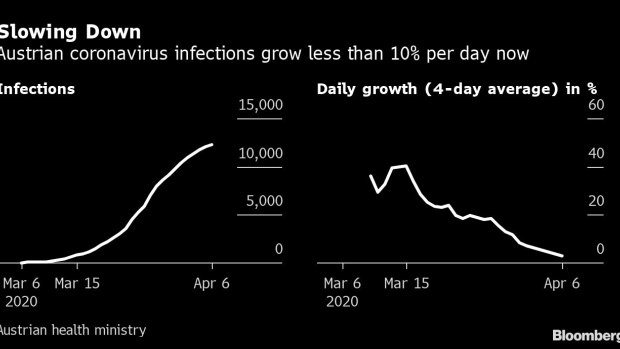Apr 6, 2020
Austria Sets Course From Lockdown After Leading Europe in Freeze
, Bloomberg News

(Bloomberg) -- When Chancellor Sebastian Kurz locked down Austria on March 11, among the first countries to do so, barely more than 200 of its people had tested positive for the coronavirus and nobody had died.
The economy hit a wall as the ski season was cut short and businesses from hotels in Vienna to car factories in Styria closed. Unemployment rose to the highest level since World War II. Yet early social distancing put a sudden brake on new infections, kept the number of severe cases moderate, and undoubtedly limited fatalities. Now Austria is planning the first steps to restart its economy as soon as next week, the first European country to do so.
“We have reacted faster and were more restrictive than other countries,” Kurz told journalists wearing face masks, while speaking behind a glass barrier in the chancellery in Vienna on Monday. “We’ll also get out of the crisis faster if everybody continues to stick to the measures.”
Governments around the world are finding that painful shutdowns of social and economic life are working to contain the pandemic, and that moving quickly yields a premium. The lockdowns in the worst-hit countries like Italy and Spain came later and necessarily were tougher than those in Austria and Denmark, another country reportedly considering next steps. The U.K. and the U.S. are still struggling to slow the spread of the disease.
In Austria, the number of active Covid-19 cases fell for a third straight day, with recoveries outnumbering new infections as of Monday morning. The total stood at just over 12,000 in a country of 8.8 million. Sixteen people died in the last 24 hours, bringing the total to 220. The number of patients requiring intensive care remained stable over the past four days at around 250.
Kurz, who said a phone call with Israeli Prime Minister Benjamin Netanyahu opened his eyes to the risks, has consistently pointed to the crisis in northern Italy, Austria’s southern neighbor, as a scenario to avoid. Doctors having to decide who lives because of shortages of intensive-care units and ventilators was the horrific alternative he presented to measures that restricted personal freedoms and that will be paid over years to come.
Voters approve. Kurz’s conservative People’s Party and his junior coalition partner, the Greens, have gained in opinion polls. The lockdown, which stopped short of a full curfew -- permitting, for example, walks in the park or jogging -- are supported by 83% of Austrians, according to a survey by Gallup released Sunday. Only 28% had a similar view of steps taken by Spanish Prime Minister Pedro Sanchez.
Austria plans to restart public life gradually after Easter, when small retailers, hardware and gardening stores can reopen. If there’s no worsening of the infection and mortality numbers, more shops will follow two weeks later, in early May. Schools, restaurants and hotels and most services would return two weeks after that.
Social distancing rules will re main in place at least until the end of April, however, and the requirement to wear face masks in supermarkets was extended to cover public transport too. Kurz urged Austrians to sacrifice their traditional Easter holiday celebrations with friends and family. He stressed that the gradual lifting of the lockdown measures could be reversed.
“Just because the numbers retreat, the danger isn’t gone,” he said. “If the numbers develop well, there will be the second step on May 1. If not, we’ll pull the emergency brake.”
Austria’s response to the pandemic sacrificed its treasured balanced budget as the government set aside funds equivalent to 10% of output to help workers and businesses cope with the disruption.
The country “took strong and prompt action to limit the spread of the virus,” said Inga Fechner, an economist at ING Groep NV. “Now, Austria is the first eurozone country to announce a loosening of the lockdown measures. If Austria’s exit strategy turns out to be successful, others will follow.”
©2020 Bloomberg L.P.